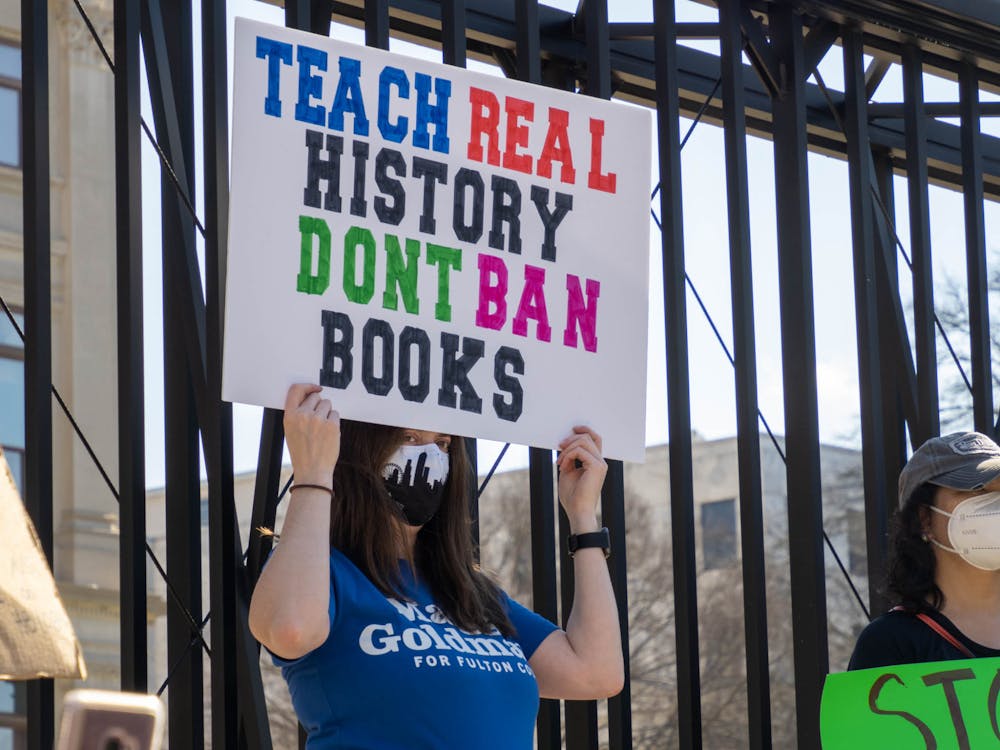By Parisa Burton
Nation & World Editor
Book banning across the United States has escalated in recent years, with over 10,000 public school book bans in the 2023-24 academic year alone, according to PEN America, a nonprofit organization aimed at protecting the freedom of expression through literature advancement.
Conservative officials in the Trump administration have publicly dismissed such bans, labeling them a “hoax” and ordering the U.S. Department of Education to end its investigations into them.
According to The Guardian, the large-scale bans are targeting books about people of color and the LGBTQ+ community, authored by individuals who identify with these marginalized groups.
The 1619 Project is a collection of works published in The New York Times Magazine that aims to “reframe U.S. history by centering the narrative around the contributions of Black Americans in building the country.” It also challenges the traditional idea that American history began with the signing of the Declaration of Independence.
This initiative has faced significant conservative backlash, dating back to 2020 with Trump arguing that it “teaches students to hate their own country,” according to The Guardian.
This Pulitzer Prize-winning project was banned in 2021 from being taught in Florida public schools by a Florida Board of Education Amendment. The proposal stated, “Instruction may not utilize material from the 1619 Project and may not define American history as something other than the creation of a new nation based largely on universal principles stated in the Declaration of Independence.”
Florida Gov. Ron DeSantis furthered this initiative in 2022 when he signed the “Stop WOKE Act” into law, which restricts the teachings of critical race theory in schools, colleges and workplaces.
The U.S. Department of Education’s Office for Civil Rights published a press release on Jan. 25, rejecting claims that removing “age-inappropriate, sexually explicit, or obscene materials” creates a “hostile environment for students.” The department stated that such actions do not violate any civil rights laws, and has ordered an end to the employment of book ban coordinators.
The American Library Association said in a response statement that the Department of Education’s claim that book bans are not real is false, stating, “Ask students who cannot access literary classics required for college or parents whose children can’t check out a book about gay penguins at their school library…Everyone, everywhere, regardless of their age, background, or political views, deserves access to information from a wide range of perspectives and books that reflect their lived experiences.”
On Feb. 4, The Big Five Publishers of the U.S. — Penguin Random House, Hachette Book Group, HarperCollins Publishers, Macmillan Publishers and Simon & Schuster — joined Sourcebooks, the Authors Guild and several other stakeholders in filing a lawsuit against Idaho’s House Bill 710, which bans important literary works.
The law specifically bans minors from obtaining library books containing sexual content, no matter the educational or literary value, according to Publishing Perspectives. Classics such as “I Know Why the Caged Bird Sings” by Maya Angelou and “The Handmaid’s Tale” by Margaret Atwood have been banned.
The plaintiffs argue that nonfiction books, including “What’s Happening to My Body? Book for Girls” by Lynda Madaras and titles on historical events such as the Holocaust will be removed from shelves. They also claim that “All Are Welcome,” a children’s picture book that celebrates diversity would be also deemed “harmful for minors” under this law.
John Yaged, CEO of Macmillan Publishers, highlighted the critical role of librarians and educators in providing a balanced selection of books, suggesting that a parent’s beliefs should not dictate what all students are allowed to read.
"Just because [another parent] has their rules doesn’t mean those rules should govern what my kid gets to read,” Yaged said.
Kasey Meehan, director of PEN America’s Freedom to Read program, argued that labeling book bans a “hoax” undermines the firsthand experiences of students, educators, librarians and authors. PEN America has also contended that the number of book bans in the past three years has surpassed those during the McCarthy era.
“There is no way to deny that our state and school districts have thwarted mine and my colleagues’ efforts to provide the highest quality education to our students without blatantly calling us liars,” Ayanna Mayes, a librarian at Chapin High School in South Carolina, told The 19th. “We have experienced what we say we have experienced. We have witnessed what we say we have witnessed.”
The surge in book bans reflects a broader conservative push against teaching diversity, race and LGBTQ+ issues in schools, according to The Guardian. Jonathan Friedman, managing director of PEN America’s U.S. free expression programs, warns that these bans serve as an “early sign of authoritarianism,” drawing comparisons to Nazi Germany’s book burnings.
The subtle nature of these actions, often framed as “removals" or “withdrawals” rather than direct censorship, makes them even more effective as they avoid public scrutiny. With a lack of media attention, these bans restrict access to diverse perspectives.
“For democracies to work, you need critical thinking so people can come up with their own points of view. The more you ban books, the less that happens,” Yaged said.







